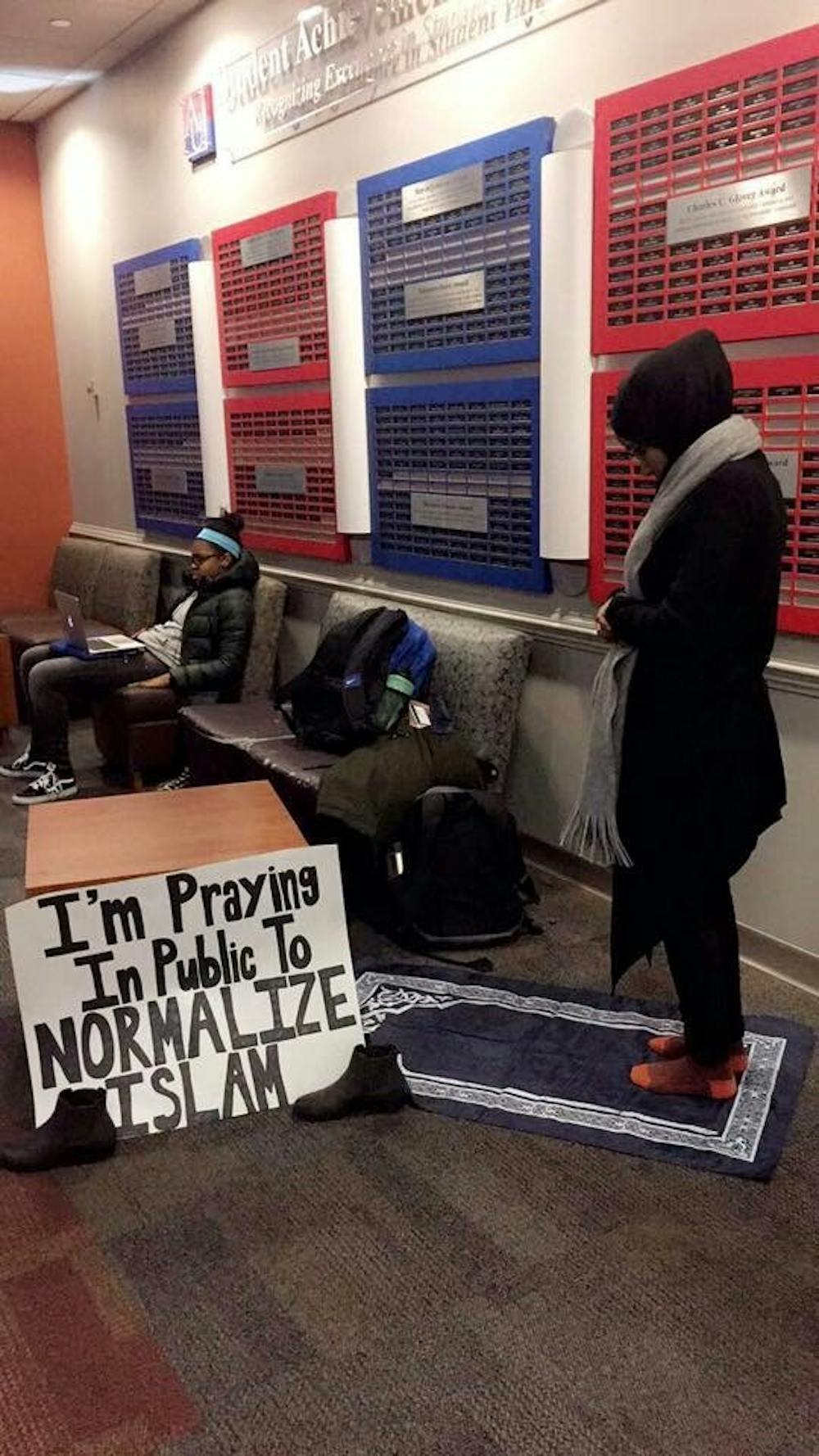College of Arts and Sciences junior Bayadir Mohamed-Osman hurried to campus on Jan. 31 to execute a plan that she had been working on for days.
After building up her courage, Mohamed-Osman placed her prayer mat on the quad next to a sign that read, “I’m praying in public to normalize Islam” and proceeded with her prayer. Later in the day, she moved to the Mary Graydon Center to begin another prayer.
“I wanted Muslims around campus to feel more comfortable with their Islam and their prayers,” Mohamed-Osman said. “I want them to know that their way of praying is just as normal as Christians sitting around the dinner table saying grace.”
A Facebook post by Mohamed-Osman’s friend, Brianna Belo, captured this moment and received tremendous feedback from the student body, with almost 500 likes and more than 100 shares expressing support.
“I was so excited to see the likes. It was weird taking the picture, because I didn’t want her to notice that I was taking it, but I just thought it was a great moment,” Belo said. “It felt good to have that documentation.”
Mohamed-Osman’s friend Nursel Hussain wrote the sign for her. When asked what the message on the sign meant to her, she said that it represented the basic human rights that all Americans, especially Muslims, should have.
“I’m not asking for anything out of the box,” Mohamed-Osman said. “I was just trying to make people remember that this is America. This is the freedom of religion that we learn about in history classes. What I’m doing is purely normal.”
Mohamed-Osman executed this act out of commitment to her own faith, she said. She does not want to be regarded as a hero, rather, she wants to emphasize how much of an impact her faith has had on her upbringing and life, and make it commonplace. She said she plans to keep praying in various places on campus.
“My faith means my peace, my happiness, it puts everything together,” Mohamed-Osman said. “The reason I am the way I am and want to be the person I want to be goes down to my religion. I want to tell everyone who compliments me, ‘Islam taught me this.’”
Salat, or prayer, is one of the five pillars of Islam, and is typically practiced five times a day. These prayers function as a way to praise God, Allah, Mohamed-Osman said. She said that her father is the one who inspired her recent act on campus, as he was adamant about praying wherever he was during the prayer times throughout the day.
“Whenever [we were] somewhere, and it was a praying time, he would literally get out of his car and pray,” she said.
Mohamed-Osman said that she often felt nervous when her father did this, because of how people would react. However, with Trump’s presidency and his recent executive order restricting immigration, she said, this option of thinking is no longer possible.
“We need to be ourselves and exist,” she said. “That is necessary.”
Belo and Mohamed-Osman were roommates freshman year. It has become normal for Belo to see Mohamed-Osman pray daily and she said that she wants it to be normal for everyone.
“The first time, I had never seen it before, but I tried to be open-minded because I knew she would be open-minded with me,” Belo said. “She would be like, ‘Hey, I’m praying in the room, I hope that’s okay with you, it’s going to be quick and quiet.”
Mohamed-Osman also cited a passage from the Quran that she grew up with. It functioned as another source of inspiration for her to publicly pray, she said. “There is an Islamic saying that the whole earth is a mosque for you,” Mohamed-Osman said.
Mohamed-Osman said that while she recognizes that she is lucky to be surrounded by people who are open-minded at AU, being a Muslim student on campus is not easy.
“It’s kind of hard to be a student, when the world is happening around you,” she said. “You feel it even though you just want to be a student. On this campus, it’s alright, maybe some microaggressions here and there.”
This act of public prayer was her first response to Trump’s executive order. After his inauguration, Mohamed-Osman stressed the importance of speaking up against injustice.
“The one thing that’s been hurting the most is people’s silence,” she said. “They’re not speaking up. It’s been hurting me a lot. They don’t speak up in classrooms, to their friends. But it’s easy to speak up on Facebook, and that’s not fair. I appreciate the support, and I love it, but I hope that translates into real life.”
More than anything, Mohamed-Osman said that she wants to normalize Islam. Being able to pray publicly and have people walk by and continue with their days is a way to enforce this normalcy, she said.
“People were telling me you know, ‘you’re a hero’, but no, the people who sat next to me while I prayed, they’re the heroes,” Mohamed-Osman said. “They have the power, the voice and the privilege. They could’ve [gotten] backlash, but they’re the ones who took the leap. I will always exist with my Muslimhood, but they put themselves on the line for me. The ones who speak up, and use their voices - I hope they continue to do that.”





